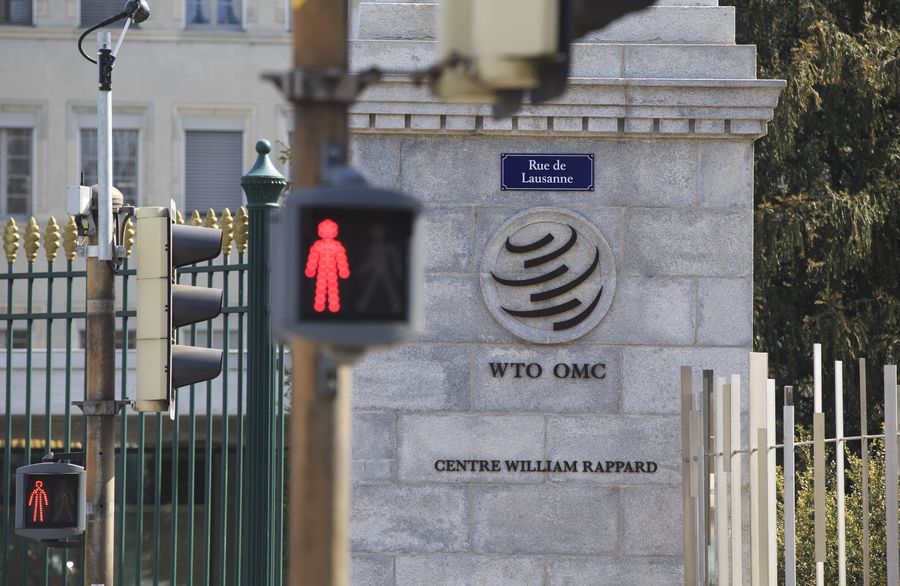US lacks justifiable response for illegal trade war
- By Mitchell Blatt
 0 Comment(s)
0 Comment(s) Print
Print E-mail China.org.cn, September 23, 2020
E-mail China.org.cn, September 23, 2020

In an act of arrogance and breach of international norms, the United States attacked the World Trade Organization (WTO) after the WTO's dispute resolution body concluded that the U.S.' ongoing trade war is illegal.
According to the report issued by the WTO settlement panel, tariffs levied by America on $200 billion of goods, including both the initial 10% tariff and the increase to a 25% rate, violated Articles I and II of the General Agreement on Tariffs and Trade of 1994. America's tariffs were deemed to be discriminatory, applying excessive rates outside the bounds of the agreed-upon schedule and applied only to goods from one country, while the U.S. was unable to articulate a justifiable rationale.
In its report, the ruling panel concluded: "While the United States asserted that any measures it adopted were necessary, the Panel considers that the United States did not offer the requisite explanation that Article XX envisages to substantiate and justify this assertion."
Rather than modifying its illegal behavior, President Donald Trump and the United States instead lashed out with vitriol further attacking the rule of law.
Trump said, "We'll have to do something about the WTO" and claimed that the organization allows China to get away with trade violations. But the WTO already has rules in place that apply to all countries, and a system to deal with allegations of violations. When the U.S., or any other country, believes a member has broken WTO rules, they can file a complaint, like China did against America's illegal tariff hikes.
If President Trump thinks China is currently committing any violations, he can lodge a complaint with the WTO.
Nor is the WTO's ruling unexpected or out of line with the viewpoints of foreign countries, with the European Union's filing agreeing with China's arguments on most points.
For example, the EU wrote that America's purported justification for its tariffs on "moral" grounds was "too indirect," as the long list of goods targeted had nothing to do with the alleged violation of "public morals" raised and unproven by the U.S. (The "public morals" clause typically refers to the protection of intangible cultural values, such as trade barriers blocking the distribution of pornographic material or other materials that violate a country's particular moral standards.)
Trump was not the only American politician to react badly to the U.S. getting slapped down by the WTO. Senator Josh Hawley responded by saying the WTO should be abolished.
This response reflects an American arrogance and myopia that has always existed to some degree but has become pronounced during America's Bush-Trump populist era. The U.S. took the lead in creating international institutions such as the WTO to promote its own interests. In fact, free trade is how the U.S. made itself rich and the country still benefits from it. One ruling doesn't change that.
The arrogance is that the U.S. thinks it should be exempt from having to follow the very same rules it writes and demands other countries follow. From invading Iraq with no UN authorization to refusing to abide by the Paris Climate Accords and violating the Joint Comprehensive Plan of Action with Iran, the past two decades have been marked by a series of American unilateral violations of international law.
America's illegitimate unilateralism has not gone unnoticed by other countries, including its own allies. With every abuse of power, the U.S. is harming its image on the world stage.
According to a recent international survey by the Pew Research Center, favorability ratings toward the United States in seven European and East Asian countries are at their lowest level of the past two decades. Even in its neighbor to the north, Canada, only 35% of Canadians have a favorable view of the U.S. The only time the numbers have been this bad was following the U.S. invasion of Iraq.
If the U.S. wants to restore its place as the moral leader of the Western world, it must change its ways.
Mitchell Blatt is a columnist with China.org.cn. For more information please visit:
http://m.keyanhelp.cn/opinion/MitchellBlatt.htm
Opinion articles reflect the views of their authors, not necessarily those of China.org.cn.
If you would like to contribute, please contact us at opinion@china.org.cn.





